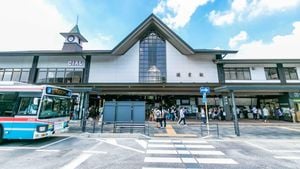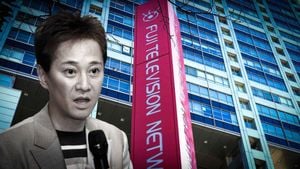Polling data released recently indicates a competitive race for the upcoming presidential election in South Korea, particularly between Lee Jae-myung, the leader of the Democratic Party, and Kim Moon-soo, the Minister of Employment and Labor. According to Sisa Journal, polling conducted on January 18-19 shows Kim leading with 46.4% of the vote compared to Lee's 41.8%. This reflects the first time since last year’s emergency rulings against the government, following the December 3 turmoil, where Kim's percentage has surpassed Lee's within the margin of error of 4.6%.
The polling data highlights regional voter preferences, with Kim outperforming Lee outside traditionally Democratic strongholds. Specifically, results indicated Kim's lead across various regions: 47.4% to Lee's 40.4% in Seoul, 49.2% to 41.4% in the Gyeonggi-Incheon area, and 54.0% to 31.4% in Busan-Ulsan-Gyeongnam. Lee, meanwhile, still enjoys significant support in Gwangju and Jeolla, where he received 61.3% against Kim’s 25.9%.
When broken down by age, the figures reveal differing support levels. Among those aged 18-29, Lee's support stands at 43.1%, slightly leading Kim, who follows with 40.9%. Support swings as age increases, particularly for the 30-somethings and voters aged 60 and above, where Kim’s support rises to 48.9% and 54.6%, respectively.
Further illustrating the competitive nature of the election, another recent survey conducted from January 20-22 revealed the geopolitical leanings and party affiliations among voters. The data indicated the People Power Party at 38% support, edging out the Democratic Party at 36%. Lee remained the favored candidate for presidency at 28%, with his competitor Kim trailing significantly behind at 14%.
The response rate for the surveys was 6.7%, and the results had a margin of error of ±3.1%—details recognized for their significance by analysts observing shifts from prior polling trends. Multiple research groups, including Embrain Public and Korea Research, conducted these studies, evidencing trends toward greater mobilization among Lee's and Kim's respective bases.
Political commentators note the growing consolidation among support bases as voter sentiment against past Democratic governance has emerged. Factors contributing to Lee's lower acceptance ratings, hovering at 56.1% unfavorable, may be reflective of widespread public fatigue with Democratic leadership amid rising conservative sentiments encapsulated by Kim's recent polling gains.
According to speculation, structural political dynamics are at play. Kim Moon-soo's ascendancy signals not only prioritization of conservative values but also poses questions about Lee's viability as the primary opposition leader. Analysts are especially divided across the spectrum, with some emphasizing Kim's emergent narrative as dismissing Lee's appeal.
Should Kim maintain his current momentum, future polling may demonstrate greater challenge levels for Lee than previously anticipated, which may contribute significantly to voter turnout strategies as both parties race to secure advantageous positions ahead of the election. Users of social media and online research platforms have increasingly engaged on concerns relating to voter integrity, leadership accountability, and the broader results following controversial legislative measures.
While Lee Jae-myung remains the focal point of prominent electoral discussions, insights arising from these polling methodologies may redefine existing voter expectations moving forward. The gap, albeit marginal, suggests the possibility of altering dynamics as campaigning intensifies. Though Lee holds favorable ratings across broader demographics, Kim’s conservative backing appears to solidify.
Voter turnout and overall engagement may hinge upon how these candidates can effectively resonate with the electorate's increasing expectations. Each candidate’s response to upcoming debates and public appearances may prove pivotal as we approach election day, with underlying sentiments on governance, policy solutions, and voter protection acting as key motivators.
Overall, polling assorted across demographics and regions is producing indications of the ever-shifting political landscapes impacted by grassroots mobilizations and societal sentiments. The combination of these factors will be instrumental as South Korea braces for what promises to be one of the most closely monitored elections.



